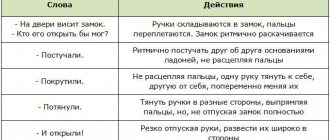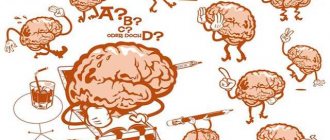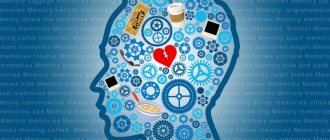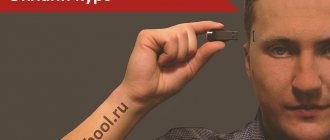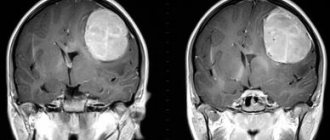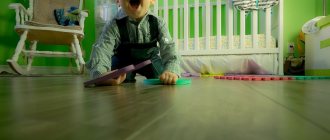Has it ever happened that you ask your child to do something and he doesn't do it? You should not jump to conclusions and assume that your child is disobedient or simply inattentive. The cause may be a completely different problem: poor memory. Most young children are very active and absorb all information like sponges. But it is often difficult for them to save and then reproduce what they heard or saw. With age, this problem can develop into a so-called “snowball”. And when the child goes to school, he will be faced with an immense stream of information that he will need to remember in order to succeed in class and be on the same level with his classmates. That is why the development of memory must be dealt with from childhood.
Poor memory in a child: reasons
It is worth noting that many children, or rather their parents, do not know about the child’s poor memory before he enters first grade. After all, it is at this moment that the number of tasks increases, so it is very difficult for the child to concentrate and perform at his best. There are several main reasons why a child may suffer from poor memory.
First grader
Causes of poor memory in a child:
- Wrong daily routine . The point is to activate all the brain centers, make memorization easier, there is no need to put pressure on the child and load him with constant cramming. Try to do loads by alternating. That is, alternate physical as well as mental activities. Accordingly, the best option would be to study for about an hour, then go for a walk or some kind of section where the child can do physical exercises, running, or strength training. This is the optimal routine. Pay attention to your baby's bedtime and wake time. Very often, poor memory can be caused by the fact that the child does not fall asleep well or goes to bed late. Accordingly, he does not have enough sleep, because of this he cannot concentrate and work productively during the day.
- Insufficient amounts of vitamins and minerals . The fact is that some vitamins, as well as microelements, help improve memory. Accordingly, their lack can provoke poor memorization. In this case, it is necessary to periodically give the child vitamins, and also review his diet in the direction of increasing the amount of healthy foods. Give preference to fresh fruits, vegetables, fish and meat. Don't forget dairy products. You should not give your child a variety of fast food and sweets. Although two sweets won't do anything bad. After all, fast carbohydrates in the form of sugar are an excellent source of brain nutrition. They will come in handy when the child is a little tired and will help turn the brain centers into work.
- Insufficient memory training . That is, the child is pedagogically neglected. Most often this occurs in children with poor speech. After all, the development of speech really indicates how well the child’s memory develops. If a child speaks poorly, swallows words, it is difficult for him to express his thoughts, he thinks for a long time about what he wants to say. Most likely there are some problems with memorization and memory.
- Another cause of poor memory in a child may be neurological disorders . Most often this is associated with difficult childbirth, cesarean, and prematurity of the child. Most often, such children, immediately after birth, are registered with a neurologist and given medications that stimulate brain activity. Accordingly, if you did not have any special problems during childbirth, but the child suffers from poor memory and all activities do not produce any results, it makes sense to consult a neurologist. A truly experienced specialist can prescribe medications that stimulate brain function and help your child learn.
IMPORTANT: It is best not to delay this, because over time these problems will become much more serious and it will be difficult for the student to absorb a large amount of information. After all, it is precisely from kindergarten, in the primary grades, that the child’s memory is formed in order to prepare him for further education.
At school
Attention and memory in modern children.
The issue of memory and attentiveness of adolescents is extremely important these days.
There is quite a lot of information today and children regularly have to memorize considerable amounts of information. Some people may seem to us like real robots with terabytes of memory, who keep information in their heads about everything that happens to them. In the same way, little children look at their parents, who solve a million problems every day.
Is it worth remembering everything if you always have a gadget at hand?
A modern teenager always has a phone in his pocket. He doesn’t have to keep all the lists and schedules in his head, because he can press a couple of keys and everything planned will appear on his phone. And a smart gadget will tell you at the right moment that it’s time to do this or that task.
This is all wonderful, of course. With a phone in hand, a person can be sure that he will not miss an event that is important to him. But among other things, this habit destroys and weakens the most important muscle in our body—the brain. You understand how our body works, right? We go to the gym to exercise our body and keep it in shape. The same thing happens with the brain. If a person stops training him, sooner or later he will become completely weak.
Why do schoolchildren need to develop attention and memory?
No matter how gadgets help us out in everyday life, any student needs to prepare for tests and tests, remember dates and rules, and learn exceptions. No schoolchild's gadget will help out here. If a student has developed memory and attention, then he will succeed in his studies, which means he will become more self-confident.
And of course, final and entrance exams, for which you have to prepare for more than 1 month. Children need to absorb and learn a huge amount of material. Children often begin preparation 2-3 years before entering university and study individual subjects. This requires enormous resources and focus.
Now imagine what it’s like to prepare for exams for a teenager with a good memory and how difficult it is for a schoolchild with underdeveloped memory and attention.
Poor memory in a child: types of medications and their effects
Initially, you need to try to improve the child’s memory through training. There are entire complexes for this. The easiest option is to learn poems with children. This method is best suited for children who go to kindergarten. By the way, this will be good training for further preparation for school. By learning poetry well, a child will quickly remember the alphabet and learn to read.
However, if such methods do not give results, and you have not moved forward, the baby still has a very difficult time remembering poetry, and it takes several hours to learn a small quatrain, then it makes sense to turn to medications. It is worth noting that there are a huge number of means for improving memory; their action can be based on different substances. The safest and most harmless are special vitamin complexes for memory. They contain a large amount of minerals and trace elements, as well as vitamins that promote memory.
On learning
Types of medications for poor memory in a child:
- Sedatives and antidepressants will help improve memory You may ask, how do these medications help improve memory? The fact is that scientists have found that people who are depressed actually suffer from memory impairment. This condition negatively affects memory and deteriorates the functioning of the brain and all systems in the body as a whole. Accordingly, if a child suffers from depression, or there is bullying or harassment at school, then, of course, it is best to give the child antidepressants and eliminate the irritating factor. In addition, such drugs may act slightly differently. Nowadays, herbal infusions, as well as special herbal components, are given for this purpose. Many of them can actually significantly improve memory.
- Substances that affect the functioning of the brain, improving its activity. Most often, such drugs are prescribed for traumatic brain injuries, strokes, and coronary artery disease. They are often given during recovery from a concussion. However, these drugs are popular with a neurologist if the child’s poor memory is due to some kind of disease. In particular, this may be increased intracranial pressure, birth trauma, as well as some organic brain damage. The child may have been injured and hit his head hard. In this case, these drugs will indeed help improve blood circulation in the brain, which will improve the child’s memory.
- It is worth noting that medications that stimulate brain function are sold only with a doctor's prescription. That is, they are not available for free sale. But they are not recommended to be given to children who do not suffer from neurological illnesses or diseases. However, if a child has any indications for use, then it is imperative to contact a neurologist. However, this most often happens in exceptional cases, when the child has really serious problems with memorization, and he cannot remember the quatrain within two hours. Indeed, in this case it is necessary to sound the alarm. We recommend that your child, who is absolutely healthy, use herbal preparations.
Homework
Poor memory in a child: medications
Review of medications for poor memory in children:
- Ginkgo biloba extract has proven itself to be excellent and is called the drug Bilobil. Ginseng extract has a good effect on memory. It is also quite a good remedy and stimulates the brain. In general, ginseng improves the functioning of the entire body and strengthens all systems.
Bilobil - One of the most effective drugs for depression is Glycine. This is nothing more than a sedative that improves brain function due to the fact that it calms the body. Accordingly, it makes sense to give the drug if the child is very nervous, suffers from excessive stress, and is also in a state of depression. It is also prescribed to infants if the child was born prematurely, as a result of which he sleeps very poorly, constantly cries and has nervous tics. In this case, this drug is really indicated.
Glycine - Medicines that improve brain function and stimulate blood circulation in it. Most often, such drugs are prescribed after traumatic brain injuries or as a result of very difficult childbirth. These drugs should not be purchased independently. Most often they are sold by prescription, so it is unlikely that you will be able to purchase them. They are the most effective and are indicated only if the child has some kind of neurological disorder. Among them we can highlight Cortexin.
Cortexin - Intellan. This is a combination product that contains plant extracts. That is, there are no chemical or artificial substances in it. The preparation contains ginkgo biloba and five more extracts of various plants. In general, the drug has a calming effect and also helps improve blood circulation in the brain. Indeed, it is recommended for children who are developmentally delayed and do not study well. Since the drug is completely herbal, only positive effects are observed from it, and there are practically no contraindications.
Intellan - Piracetam contains a substance of the same name, which is a synthetic analogue of aminobutyric acid. Thanks to the effects of this drug, the blood vessels of the brain dilate, reducing susceptibility to various nerve impulses. Accordingly, the child thinks faster and remembers information. This drug is also recommended for use before exams, under heavy study loads. The drug is also prescribed to older people to reduce the manifestation of sclerosis and other diseases associated with memory impairment.
Piracetam - Biotredin. This drug contains amino acids that improve brain activity. Do not be alarmed when you read in the instructions that this drug is prescribed for the treatment of alcoholism. Yes, indeed, this medicine is prescribed to patients with alcoholism to restore and improve brain function. However, the drug is also intended for teenagers, as well as children under 15 years of age, with excessive fatigue and memory impairment. The amino acids that make up the drug also improve the condition of the brain, improving blood circulation in it. In addition, the drug has a sedative effect and generally relaxes the entire body.
Biotredin - Cerebrolysin. This drug, which is sold as an injection, is a kind of first aid for improving brain function. Most often, injections are used for traumatic brain injuries, after a stroke or serious brain damage. This drug should definitely not be used by absolutely healthy schoolchildren who suffer from increased fatigue. However, this is an excellent drug if the child suffers from neurological disorders and organic damage to the brain and nervous system.
Cerebrolysin - Phenibut. This drug belongs to psychostimulants, nootropic drugs. It is worth noting that it is prescribed in case of memory loss, poor learning, and also increased anxiety. Most often, the drug is prescribed in the presence of nervous tics, impaired learning, as a result of enuresis, stuttering, and children over 8 years of age. In general, the drug is a sedative and stimulates the brain, improving memory. The drug should not be used without a prescription. This is a medicine that is prescribed exclusively by a doctor and taken according to indications. Most often, the drug is prescribed if a child has nervous tics, as a result of which memory decreases. There is no need to give this drug to absolutely healthy children.
Phenibut - Cerakson. The drug contains citicoline. This is a substance that helps improve brain function. Most often prescribed after traumatic brain injury, to improve brain function. In addition, it is prescribed for degenerative disorders of the brain and the death of some of its cells. The drug is recommended after strokes; it is also indicated for children who suffer from reduced attentiveness syndrome and have very poor learning. Most often, this drug is prescribed after neurological disorders that were noted in childhood. It helps improve brain function and also prevents the situation from getting worse. The drug is sold as an injection, as well as syrup for children.
Cerakson - Somazina. This drug also contains citicoline, that is, it is an analogue of the previous one. Prescribed for memory impairment, as well as memory deterioration. In addition, it is given after traumatic brain injury to improve brain function and reduce traumatic syndrome. The drug is sold in the form of sachets and syrup. The drug is not prescribed to children, but neurologists give this drug even to babies under the age of 1 year. The drug stimulates brain function and also helps to significantly improve memory. It is most often used in the treatment of children who have neurological disorders, which is why they suffer from memory impairment.
Somazina
The “unwanted” syndrome
Children with MMD are not inferior to their peers in terms of intelligence and abilities. But an imbalance in the work of certain areas of the cerebral cortex leads to a delay in the rate of development of the most important functional systems of the brain (speech, perception, attention, memory, motor skills and others).
Disturbances in the development of a child may manifest themselves:
- Reading problems (dyslexia)
- Writing disorder (dysgraphia)
- Speech dysfunctions
- Problems with counting (dyscalculia)
- Problems with motor development (lag behind age norms)
- Attention deficit disorder Attention deficit hyperactivity disorder
(abbr.: ADHD) A neurological-behavioral developmental disorder that begins in childhood.
Symptoms: impaired attention, difficulty concentrating, hyperactivity and poorly controlled impulsivity. and hyperactivity Hyperactivity
A condition in which a person’s activity and excitability exceeds the norm. It is more common in children and adolescents, as it is caused by emotions.
The combination of manifestations of minimal brain dysfunctions can be very different. But almost always the result of MMD is maladaptation in the team, problems in learning, and frequent conflicts with parents and teachers are possible. Children have difficulty concentrating on a task, make many mistakes when completing it, and behave unpredictably and impulsively. And when it comes to studying or other activities that cause difficulties for the child, parents are faced with loud whims and statements “I don’t want to!” According to statistics, manifestations of MMD can be found in at least 20% of schoolchildren.
A child has poor memory - what to do?
A child has poor memory - tips:
- If you do not want to give drugs to children, you can try to improve it with special activities. If you see that your child grasps certain information much better, try to give it in that form.
- It's no secret that some children really have better visual memory, while others, on the contrary, perceive information much more effectively by ear. That is, auditory memory is much better. Depending on the child’s sensitivity, choose the method of presenting the material.
- That is, if a child has visual memory, then give him information in the form of some drawings, letters, printed text or some kind of presentations. If your child has developed auditory memory, try to talk and read aloud more.
- Ask him to say everything out loud when completing tasks, and also to read the tasks out loud so that his ears catch the information. It is worth noting that to improve memory with the help of exercises, a complex is performed, as well as special classes. If possible, send your child to a memory development center. If not, he can study at home on his own.
Child has poor memory
How to improve a child’s memory: tasks, methods
As for preschool children, it is best to present information to them in a playful way, and also to develop memory with the help of poems, tongue twisters, and interesting rhymes. Start with the simplest and most fun. These could be some kind of ditties, songs, poems. Everything that is learned in kindergarten is done for a reason, but with the goal of developing the child’s memory and stimulating brain function. This is a kind of preparation of the child for school.
Tasks for a child’s poor memory:
- The child may have a really bad grasp of information, but there is no need to be upset. The simplest option is to use a quatrain. Say the quatrain several times, and starting from the third time, ask the child to finish the sentence. Have the child say the last word in the line first, then the last two words in the line, and then three. In this way, the child will be able to fully master the entire poem.
- Oddly enough, but learning dances also contributes to memory development. The simplest option is the dance of little ducklings. What does dance have to do with memory? The fact is that in the case of learning dances, the child’s visual memory improves, and his attention is focused specifically on the movements. Accordingly, the child picks up the oscillatory, translational movements of the arms and legs, and will be able to reproduce them. If your child has trouble remembering poetry, try teaching him to dance. This really helps improve memory.
- Tell stories to your child. Try somewhere in the middle or at the beginning to ask what the kid thinks about the main character, how he imagines him. Such small digressions really help improve memory and memorization. Next time the child will be able to clearly tell you what the fairy tale was about and who the main character is. Tell a fairy tale about the Gray Wolf and Little Red Riding Hood, then ask what color the wolf’s fur was, and what color the main character of the fairy tale’s hat was. Attention to detail also develops a child's memory.
- Try to ask the baby what he did during the day in the garden, what he ate today, and what he remembered. When dressing your child for kindergarten or school in the morning, focus on the color of the underwear or some details that are depicted on the swimming trunks. When your child comes home from school, ask if he remembers what color his swimming trunks are and what is depicted on them. Oddly enough, it really works and helps train your memory. Also, be mindful and pay attention to details during the weekend or when spending time at home. Ask where he left his things, how the wheels are dismantled, and what color the bus was on today. This all helps to concentrate and improve memory.
Activities with the child
No matter how strange these methods may seem, by the beginning of the school year the child will really show good progress in memorization. Children whose parents focused on details and little things really learn to read and write faster and are easy to teach.
How to train a child's memory
Even basic conversations with a child, finding out how he is doing, asking him to tell him what happened in kindergarten, at school, already activate the areas of the brain that are responsible for memory. The more parents ask questions, the more active these areas are, and memory training occurs. Ask your children every day about their affairs, do not stop the story, listen to the end of any phrase. We advise parents to read the book by foreign psychologists Adele Faber and Elaine Mazlish “How to talk to children so that they learn.” This is a global bestseller that teaches simple, accessible and at the same time unique strategies for communicating with children, helping parents teach their children self-discipline and concentration.
Memory training exercises
There are many exercises that help train children's memory. All tasks must be appropriate to their level. You cannot give tasks “for growth”. Difficulty increases gradually. During classes, it is necessary to interest children in game techniques. It stimulates competition well and winning prizes. Instructions must be given in a language that the child understands. To obtain the best results, visual memory training should involve motor-motor and auditory sensations.
List of simple and effective ways to develop memory:
- "Picture"
. Take a picture and let your child look at it for 50 seconds. Let him try to remember as many details as possible. Then replace the first picture with a second one, which has a slight difference in detail. The child has to answer what has changed. The older the children are, the more details should be present in the picture. The task becomes more difficult gradually, regardless of age.
- "Toys".
Place 6 toys in front of your child, similar in size and color. Give him time to remember - 15-20 seconds. Let him look away. During this time, remove one toy. The child has to answer which toy is missing. The game gradually becomes more difficult with the number of items. You don’t have to remove the toys, but swap them around.
- "Keyhole"
. Prepare a small but bright picture, a sheet of white paper that is 4 times the size of the picture. In the middle of the sheet you need to cut a hole, which in its shape resembles a keyhole. The adult covers the picture with a sheet and places it in front of the child, who has to see what is shown through the hole. The sheet can be moved around the picture. Next, the child tells what is shown in the picture. The image is then opened and compared to the story.
- "Matches"
. The child and the adult are given the same number of matches. The remaining matches are thrown onto a flat surface. You are given 30 seconds to consider the resulting combination. The players' task is to repeat the layout. The one with the most accurate combination of matches wins.
- "Magic bag"
Prepare an opaque bag, you can use a gift bag. Look at the toys with your baby, then put them in the bag one by one. The child’s task is to remember what toys are in the bag. As you master the game, it becomes more difficult. You can increase the number of toys, you can ask the child to remember in what order the toys were put into the bag.
- Place doll dishes on the table, place toys at the table
. Tell us that it’s Sasha’s doll’s birthday today. Friends came to her for the holiday. And so everyone ran to watch the fireworks. When they returned, someone had taken the wrong seat. The child will guess which of the toys is not where it was originally.
- "Geometric figures".
Arrange geometric shapes in a row. For example, triangle, square, circle, rectangle, circle, etc. Ask your child to reconstruct a series of figures from memory.
Learn poetry with your children, this is a great way to improve memory, not only in children, but also in adults. For children at 5 years old, it is preferable to choose short poems with verbs; at 6 years old, it is better to introduce children to poems that are large in volume, but easy to memorize.
